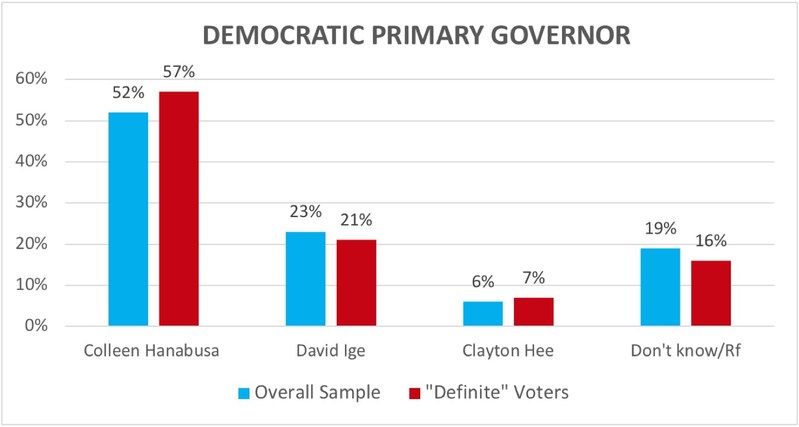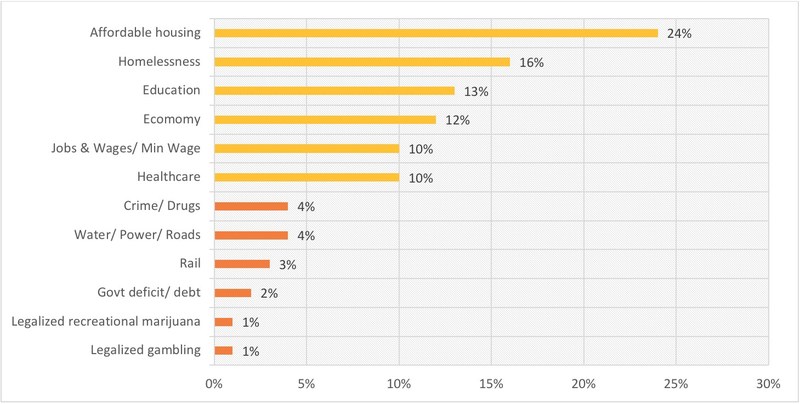Latest Poll: Hanabusa Leads Ige by More than 2-to-1
Other Poll Results:
News Release from Hanabusa for Governor
HONOLULU, May 25, 2018 -- In the most recent and largest poll of likely registered Democrat voters, Congresswoman Colleen Hanabusa holds a commanding lead over incumbent David Ige.


The poll was conducted by Qmark Research of Honolulu from April 21 to May 7, 2018. It included registered voters with a history and likelihood of voting in the 2018 Democratic Primary Election to be held on August 11, 2018. It should be noted that the study period of this survey began after the Ige campaign had begun its TV advertising and was completed before the Hanabusa campaign TV advertising was launched.
The total sample size was 888 individuals statewide, including voters from Oahu (477), Maui County (99), Kauai (75), and Hawaii Island (237). The mixed mode methodology included live caller contacts to landline telephones and mobile phones, as well as online survey contacts, approximately one-third using each mode. (To ensure greater accuracy, the survey did not include so-called robo calls.)
The margin of error for a total sample of this size (n=888) is +/- 3.36 percentage points with a 95% confidence level. To date, this is the largest Democratic Primary sample size and lowest margin of error in a poll this election cycle.
RACE FOR GOVERNOR
In the poll, registered voters who indicated a likelihood of selecting the Democratic Ballot in the upcoming primary election were asked which of the top candidates for governor they would likely support if the election were held today. It showed Colleen Hanabusa holds a greater than 2:1 advantage over the incumbent David Ige, 52% to 23%.
Undecided/Don't Know voters comprised 19%. Even if David Ige could capture the entire undecided vote, he would still fall well short of closing the lead Hanabusa holds.
At just 6%, Clayton Hee is a relative non-factor in the race.
Hanabusa's lead over Ige is more pronounced on the Neighbor Islands where she holds a 36-point advantage over Ige. On Oahu, Hanabusa's lead is 27-points.
Looking only at those who say they will "definitely vote" in the primary, or who have a strong history of "always voting" in primary elections gives Hanabusa an even larger lead over Ige: 57% to 21%.
Significantly, Hanabusa holds double-digit leads in every demographic group: ethnicity, gender, age, geography, union/non-union, years in Hawaii, employment, and conservative or liberal ideology.
Among voters of Japanese ancestry, Hanabusa captured 60% of this important demographic segment compared to 18% for Ige. Among Caucasians, Hanabusa holds a 22-point lead over Ige, with an even wider gap among Native Hawaiians (33-point lead).
FAVORABILITY RATINGS
Among all of the candidates for governor tested, Colleen Hanabusa receives the highest favorability score (mean/ratio). Nearly two-thirds (64%) of potential voters polled currently have a favorable opinion of Hanabusa. Nineteen percent hold a negative view of her, while 14% have yet to form an opinion.
| |
FAVORABLE
|
UNFAVORABLE
|
NO OPINION
|
RATIO
FAV:UNFAV
|
MEAN
|
|
Hanabusa
|
64%
|
19%
|
14%
|
3.36:1
|
2.46
|
|
Ige
|
42%
|
42%
|
15%
|
1.00:1
|
1.99
|
|
Hee
|
19%
|
27%
|
41%
|
0.70:1
|
1.90
|
- Hanabusa is strongest on the Neighbor Islands where 69% have a favorable opinion of her while just 14% think negatively. Her numbers on Oahu are also solid (62% favorable, 21% unfavorable.)
- Female voters tend to have a more favorable opinion of Hanabusa with an only 15% unfavorable showing.
- David Ige did not fare well in any group, receiving a 1:1 favorability ratio, meaning for every favorable opinion there was a corresponding negative sentiment toward the governor.
- Clayton Hee received significantly more unfavorable opinions than favorable.
KEY CANDIDATE ATTRIBUTES
Registered voters were also queried on their reasons for choosing Hanabusa over Ige. When asked which candidate they associated most with each favorable attribute, they selected Hanabusa as the leader in every category:
| ATTRIBUTE |
HANABUSA |
IGE |
| "Is a strong leader" |
60% |
14% |
| "Communicates clearly" |
57% |
13% |
| "Gets the job done" |
52% |
19% |
| "Has a deep understanding of the issues" |
49% |
17% |
| "Is an ethical officeholder" |
42% |
26% |
| "Cares about Hawai'i" |
42% |
18% |
ISSUES OF GREATEST VOTER CONCERN
Registered voters were asked about some of the largest campaign issues facing our community, and then ranked the ones of greatest importance to them.
Key findings of the most relevant issues included:
- Homelessness is something that Oahu (19%) voters identified as their top issue and did so in greater numbers than their Neighbor Island (9%) counterparts.
- Female voters were more likely to select either education or jobs and wages/minimum wage as their most important issue than were male voters.
- Younger, less affluent voters were more likely to select jobs and wages/minimum wage as their top issue. Filipinos in particular appear more concerned about this topic.
- Affordable housing is more likely to be selected by liberals, while the economy was the top choice among conservatives likely to vote in the Democratic Primary.
- Legalizing recreational use of marijuana and legalized gambling were not considered significant compared to other issues.
PROFILE OF SURVEY RESPONDENTS
| |
OVERALL
|
COMMENTS
|
| |
|
|
|
ISLAND
|
|
|
|
Oahu
|
71%
|
Weighted to population estimate of adults 18+
|
|
Big Island
|
13%
|
|
|
Maui County
|
11%
|
|
|
Kauai
|
6%
|
|
|
OAHU
|
|
|
|
Metro HNL
|
33%
|
Random sample.
|
|
East HNL
|
11%
|
|
|
Windward/ North Shore
|
15%
|
|
|
Central
|
25%
|
|
|
West
|
16%
|
|
|
VOTE HISTORY
|
|
|
|
All/Most
|
85%
|
Majority have voted in all or most of the elections since eligible.
|
|
Some/Few
|
12%
|
|
|
1st Time voter
|
3%
|
|
|
POLITICAL PARTY
|
|
|
|
Democrat
|
87%
|
Screener ensured high proportion of Democrats in sample.
|
|
Independent
|
7%
|
|
|
Republican
|
2%
|
|
|
Refused
|
5%
|
|
|
UNION HOUSEHOLD
|
38%
|
|
|
BORN IN HAWAII
|
62%
|
|
|
RESIDENCE
|
|
|
|
Own
|
67%
|
|
|
Rent
|
29%
|
|
|
AGE
|
50.65
|
|
|
ETHNICITY
|
|
|
|
Caucasian
|
28%
|
Targeted proportion based on estimate of adults over 18 years of age.
|
|
Japanese
|
28%
|
|
|
Hawaiian
|
18%
|
|
|
Filipino
|
13%
|
|
|
HSE INCOME
|
|
|
|
< $50K
|
21%
|
|
|
$50K-$100K
|
36%
|
|
|
$100K+
|
32%
|
|
|
Refused
|
11%
|
|
|
GENDER
|
|
|
|
Male
|
45%
|
Targeted proportion based on estimate of adults over 18 years of age.
|